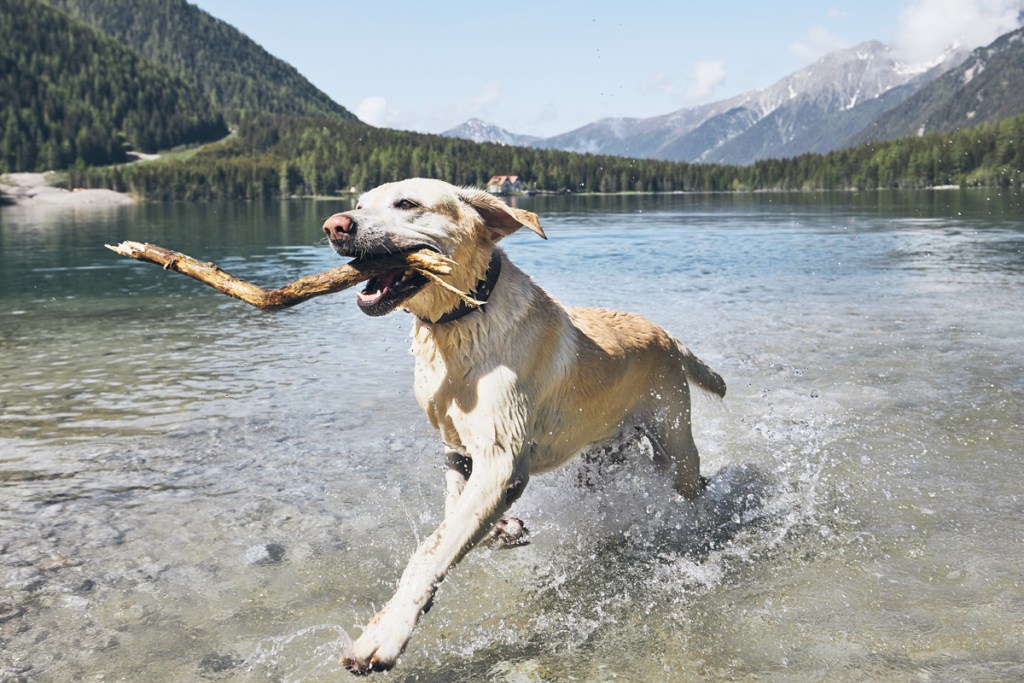If you’re looking to add a pup to your family and trying to choose between a Labrador retriever and a golden retriever, you’ve narrowed it down to two of the most popular dogs in the U.S. Both consistently make the American Kennel Club’s Top 10 Breed list. Labradors have held first place on that list for 30 years, while goldens typically rank third or fourth. This isn’t surprising since these breeds make wonderful companions and service dogs. So, what are the differences between these breeds, and which would fit best into your lifestyle? Let’s see.

Golden retrievers
Background: Golden retrievers were originally bred to retrieve ducks and other fowl on the wet and rugged terrain of the Scottish Highlands. According to the American Kennel Club (AKC), the breed first made an appearance in the British show ring in 1908 and arrived in the U.S. around the same time.
Temperament: Golden retrievers are considered even-tempered, intelligent, and affectionate dogs. They love people, love attention, and typically get along with other pets as long as they are properly socialized. Like most sporting breeds, goldens need plenty of daily exercise and make great companions for long runs or bike rides, say AKC breed experts. Be prepared to meet lots of new people when you are out and about with your golden because they just have to say hello to everyone.
Training: These dogs are people pleasers, making them easy to train and explaining why they make great assistance dogs. Early socialization with people and other dogs will help the golden develop into a well-behaved adult. This breed loves to have a job, and many families teach them to do fun things like fetching slippers or their leashes.
Coat maintenance: Golden retrievers are known for their gorgeous flowing coats, but it takes work to keep this breed looking so beautiful. They are big shedders, and they need to be brushed every day to avoid matting. Grooming experts advise bathing your golden once every six to eight weeks.
Labrador retrievers
Background: According to the Labrador Retriever Club Inc., the parent club of the breed in the U.S., these dogs were bred to retrieve ducks and act as companions to fishermen in Newfoundland. Breed experts at the AKC say that it was sporting lords and earls who brought these dogs to England, where they “refined and standardized” the breed into the Labrador retriever we know today.
Temperament: Labradors are friendly, outgoing dogs. The AKC describes them as a great choice for families looking for a medium-to-large-sized dog. Labradors generally won’t play favorites and will bond with all family members equally. They are devoted and enthusiastic companions who will be more than happy to tag along on family adventures. When considering a Lab, keep in mind that this breed’s easygoing personality doesn’t mean a low-energy dog. According to the AKC, Labrador retrievers are “enthusiastic athletes” who require lots of exercise. Swimming, long games of fetch, jogging, or hiking will keep this breed happy and in shape.

Training: Labrador retrievers are intelligent dogs and quick learners. Because they are strong, high-energy dogs, they must attend puppy training classes and be socialized early. Leash training when young is especially important as you don’t want a big, strong puller on your hands. According to the AKC, Labs are ideal for competing in canine sports such as agility, Rally-O (obedience trials), tracking, or dock diving.
Coat maintenance: Labradors have thick, water-repellent double coats. Grooming experts recommend bathing these dogs every four to six weeks. While this breed can shed some hair year-round, their main shedding seasons are spring and fall, when they need to be combed daily to remove the dead hair. At other times of the year, the coat should be brushed at least once or twice a week.
Main differences between these breeds
While goldens and Labs have a lot in common, there are some differences that might help you choose the best dog for you.
- Health is an important consideration. Both breeds are susceptible to certain health issues such as hip or elbow dysplasia, but a study published in the Journal of Veterinary Medicine found that golden retrievers developed cancer significantly more often than other breeds, including Labrador retrievers. Experts at the National Canine Cancer Foundation say that while no one can predict which dogs will get cancer, a higher-risk alert can make pet parents more vigilant about monitoring their dogs’ health.
- When it comes to grooming, you can expect to spend far more time caring for a golden’s coat than that of a Labrador.
- Labradors require more exercise. Be sure you have the stamina for this breed to ward off destructive behavior.
- Goldens tend to be a little more clingy than Labradors, making them susceptible to separation anxiety if left alone for too long or too often.
As you make a final decision, keep in mind that each dog is an individual, and choosing a particular breed doesn’t guarantee a certain temperament. Experts at the Animal Farm Foundation say that in addition to breeding, the behavior of all dogs is influenced by many outside factors such as training, the environment, and socialization. In the end, whether you choose a golden or a Lab, you can’t go wrong, as both breeds would make a wonderful addition to any family.



